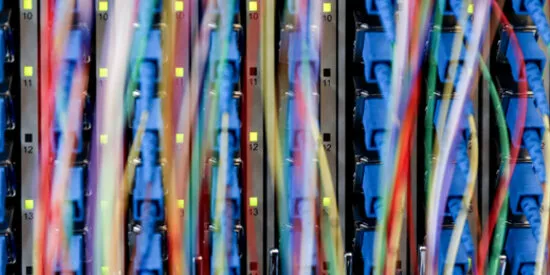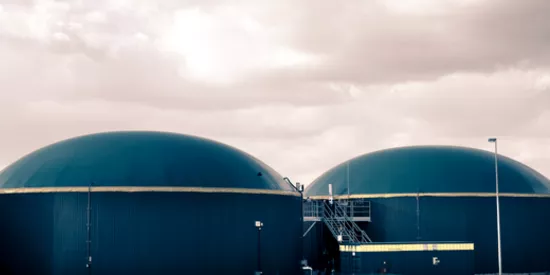
LNG marine fuel: first port of call on the net zero voyage
Financing one of the world’s first purpose-built LNG Bunkering Vessels to support low-carbon shipping
As economies begin to recover from the global COVID-19 pandemic, the shipping sector, mainstay of global trade, faces particular challenges in achieving meaningful greenhouse gas (GHG) emissions reductions: due to its vessels’ long operating lives and a lack of low-carbon technologies, it will take decades to replace existing fleets with more climate-friendly assets.
New targets, new fuels
The International Maritime Organisation (IMO) calculates that GHG emissions from all shipping increased 9.6% between 2012 and 2018, from 977 million tonnes in 2012 to 1,076 million tonnes in 2018. If no action is taken, emissions could increase to as much as 130% of 2008 levels by 2050, depending on economic growth1. As a result, the IMO is targeting a 50% reduction in emissions by 2050 in addition to a 40% cut in carbon intensity by 2030, starting with a 0.5% cap on sulphur emissions introduced in January 20202.
The shipping industry is exploring zero-carbon fuels – such as hydrogen and electric power – with the goal of introducing the first commercially viable zero-emission ships by 2030. But to enable shipping companies to start reducing emissions today, transition fuels such as liquid natural gas (LNG) are an important part of the solution.
Compared to heavy fuel oil and marine diesel, LNG has significant air quality benefits, virtually eliminating sulphur dioxide (SOx), nitrous oxide (NOx), and particulate matter from exhaust emissions. It can contribute to up to a 23% reduction in CO2 when compared to very low sulphur fuel oil – a significant first step in the shipping sector’s net-zero journey. Societe Generale is the first financial institution to join SEA/LNG, a multi-sector industry coalition promoting the use of LNG as a marine fuel3.
Supporting clients’ goals
Acting as sole Mandated Lead Arranger (MLA) and Senior Lender in the EUR 28.75m (USD 34.09m) debt financing, Societe Generale facilitated a pioneering transaction for an Asian client recently by arranging the sale-and-leaseback financing of a 6,500-cubic metre (CBM) purpose-built LNG bunkering vessel (LNGBV) – New Frontier 1 – on behalf of Pan Ocean, one of South Korea’s largest ship owners and operators. The counterparty, one of the affiliates of Royal Dutch Shell, will continue to operate the ship in North-Western Europe, providing fuel storage and transfer services to LNG-fuelled vessels.
This strategic investment enables Societe Generale to support Pan Ocean as it expands and diversifies its fleet portfolio to establish a sustainable growth base for the future. Acquiring its first LNGBV also demonstrates the client’s contribution to decarbonising the shipping industry, playing a key role the energy transition.
“Transition fuels like LNG, which is well-established, readily available and cost competitive, will play a critical role in bridging the gap to the zero-carbon shipping of the future. Pan Ocean’s investment in strategic LNG assets aims to build out the infrastructure to support the transition, both for our own vessels and for the shipping sector as a whole. We are pleased to work with Societe Generale to support the decarbonization of shipping industry,” said K.B. Oh, Team Head of Finance at Pan Ocean.
LNG paves way for zero-carbon shipping
Bunkering vessels are an essential part of LNG infrastructure, especially in areas where onshore facilities are not suitable or available for LNG handling. Financing New Frontier 1 advances the transition of the world’s fleet to a new source of energy and fits perfectly with Societe Generale’s commitment to responsible ship financing.
“Societe Generale is committed to supporting its clients in meeting their business goals, including providing financing solutions that enable them to meet their emissions reduction targets. This commitment also helps us deliver on our commitment to work closely with the shipping sector as it decarbonises its operations toward a net-zero scenario in the coming years,” commented Gwenael Delattre, Head of Shipping & Offshore Finance, Asia Pacific at Societe Generale.
New Frontier 1, the first LNGBV in Societe Generale’s portfolio, marks Pan Ocean’s first of many future investments in this niche segment. Although LNG bunkering remains a new and niche sector with only 31 vessels in operation today, it is expected to grow quickly: 23 LNGBVs are on order, and more are likely to follow to service a growing global LNG-fuelled fleet.
1 https://wwwcdn.imo.org/localresources/en/OurWork/Environment/Documents/Fourth%20IMO%20GHG%20Study%202020%20Executive-Summary.pdf
2 https://ec.europa.eu/environment/air/sources/maritime.htm
3 https://wholesale.banking.societegenerale.com/en/insights/news-press-room/news-details/news/societe-generale-becomes-first-financial-institution-join-growing-sealng-coalition-1/




